An excursion down the rabbit hole of intertextual analysis when studying cinema may provoke the viewer to reassess and reinterpret popular filmic texts in order to investigate an idea and peer into its thematic voyage through time from one film to another. The comparison of films seemingly at the binary opposite spectrum of theme, genre and stylisation may possibly bring forth previously undiscovered connections and allusions which, when contextualised within history, can illuminate an idea and represent its provocative continuation and expansion through time. A notion of call and response is therefore established: one film (the earlier text), a scream into the night; the other its haunted, insidious cry back. Such is the case when studying and thematically juxtaposing films such as The Wicker Man, Robin Hardy’s bawdy, blasphemous 1973 cult favourite, and the films within the Mamma Mia! cycle of folk musicals; texts diametrically opposed on the surface that when contrasted elucidates a call and response across time. What, you may ask, do these films, one a deeply upsetting exploration of theological warfare, the others light, deft, feel-good musicals to which the timeless tunes of pop maestros ABBA are foisted into narrative position for a tale of mother-daughter companionship amidst familial conflicts on the rise, have in common?
Simultaneous studies in communal rituals and rites, false idolatry, post-60s sexual mores and the hereditary nature of egotism, The Wicker Man, Mamma Mia! and Mamma Mia! Here We Go Again—when viewed as a cyclical hypertext and cross-referenced to the point of insanity—paint similar, sacrilegious portraits of post-liberated societies grappling with social malaise and fractured identities to which communal hysteria is commonplace and the corruption of children is the norm. The Wicker Man was the warning; the Mamma Mia! films its foolish response echoed through time, as all three films are fascinating social and cultural documents that envision—through their simultaneously searing, yet flippant engagement with politics concerning religious freedoms and sexual mores—a world of skewed liberal belief systems and their warped, tainted morality.
The Wicker Man or: “Howie, Howie, How He Thrills Me, Uh Huh, Howie Howie”
Regarded by Cinefantastique as “the Citizen Kane of horror movies”, Robin Hardy’s classic of fiery theological provocation The Wicker Man stands alongside Nic Roeg’s Don’t Look Now as perhaps the finest British horror text of all-time. Its socio-political commentary on autocratic paganism versus authoritarian Christianity is a haunting microcosm of a post-60s England in which the idealism of the past has been taken to tyrannical extremes in the early stages of the 1970s. With dissent common among the youth of the ’70s and the distrust of political and religious authority sprawling across all facets of society, The Wicker Man powerfully manipulates such social unease into a narrative brimming with rich, scabrous satire that cleverly capitalises on the malaise of the era by turns haunting and upsetting, lyrical and bizarre.
Taking place on the (fictional) Scottish island of Summerisle, Hardy, with his screenwriter Anthony Shaffer, concoct a devilish tale of the warfare between Gods old and new unto which a child—12-year-old Rowan Morrison—is at the story’s center. A symbol of supposed innocence in a world gone astray, it is Rowan’s mysterious disappearance that catalyses our protagonist Sergeant Neil Howie’s odyssey into an occult abyss to which exhibitionist sex and spiritual fervour form a powerful synecdoche revealing the extent to which ’60s liberalism corrodes upon social morality and accentuates hedonism, decadence and egotism. Summoned to the island—by “a siren call, maybe?” Sophie (Amanda Seyfried) would most surely suggest—to investigate said disappearance, Howie (an extraordinary Edward Woodward) is the film’s moral center; the viewers’ sympathy directed at him as the free-loving liberation shared by the residents of Summerisle (with its presentation by both Hardy and Shaffer) a shock to the senses for the audience and an affront against the devout Christian beliefs of Howie.
With his rabid adherence to Christianity openly mocked in the film’s opening prologue, Howie is very much a relic of the past, a dinosaur whose reverence to Christian beliefs place him—on an ideological level—diametrically opposed to the beliefs shared by the residents of Summerisle and their leader (a gleefully charismatic Christopher Lee). The film suggests Howie is the past and Summerisle is the future; the island a microcosm of the countercultural social, political and religious dissent apparent within early ’70s English society, as their unambiguous devotion to their pagan Gods presented in stark contrast to that of Howie’s Christianity. Brilliantly, Hardy and Shaffer decontextualise the beliefs shared by the residents of Summerisle in the film’s opening third. The abstraction of context allowing the viewer to align their sympathy with Howie and Howie alone. The strange behaviour of the townspeople offending both his and the viewer’s beliefs by way of coarse public sex orgies and the perversion of liberalism from idealistic to tyrannical in the extreme.
However, the film’s genius lies in the gradual contextualisation and framing of the pagan beliefs communally shared the residents of Summerisle as a distinctly autocratic belief system composed for authoritarian gain. Developed by the long-departed Victorian agronomist grandfather to the island’s current leader (Lee), the faux religion—initially a manipulative ploy to strike fervour into the hearts of its blind followers and create rabid ideological adherence—has since been gentrified into the paganism present on the island currently. The faith, therefore, has been hijacked by its tyrannical head ruler. As a result, the viewer is able to draw stark parallels between the Christianity embodied by Howie and the modern paganism represented by Lord Summerisle in that both belief systems seek to impose social harmony through devout faith and similarly rely on the manipulation of the individual to do so. This, in turn, manipulates the viewer and forces them to consider whereupon to lay their sympathy from here: if Howie and Lord Summerisle embody a theologically divergent, yet structurally similar belief system to which fervour, sacrifice, rites and rituals are all commonplace, which do we, as an audience, intuit as moral and worthy of our sympathy?
 As a result of this questioning polemic of theology and the refusal to further pick sides, Hardy and Shaffer are able to contrast his hero and villain as both sides of the same coin: one traditional in its outlook, the other progressive. They both rely on autocratic rule and the fervour of adherents to spread their influence, just as they represent a passage of egotism passing through the generations: Lord Summerisle’s figure as a supreme leader stemming from his grandfather’s similar egotism years prior, and Howie’s moral righteousness egotistically stemming from the pretension of his faith. They are one and the same and crucially mirror and invert each other in the internal contrast between traditionalist and progressive politics; this inversion a representation of the fractured social sphere of English society in the 1970s and its disillusionment in the wake of the countercultural latter stages of the ’60s.
As a result of this questioning polemic of theology and the refusal to further pick sides, Hardy and Shaffer are able to contrast his hero and villain as both sides of the same coin: one traditional in its outlook, the other progressive. They both rely on autocratic rule and the fervour of adherents to spread their influence, just as they represent a passage of egotism passing through the generations: Lord Summerisle’s figure as a supreme leader stemming from his grandfather’s similar egotism years prior, and Howie’s moral righteousness egotistically stemming from the pretension of his faith. They are one and the same and crucially mirror and invert each other in the internal contrast between traditionalist and progressive politics; this inversion a representation of the fractured social sphere of English society in the 1970s and its disillusionment in the wake of the countercultural latter stages of the ’60s.
Both adhere to strict gendering based upon the bifurcation of men and women within their sacred texts and general theological beliefs. “It is the image of the penis, which is venerated in religions such as ours, as symbolising the generative force in nature” Miss Rose (Diane Cilento) claims in a class discussion within the film. The veneration of the phallic symbol is a cornerstone of the ideologies inherent within Lord Summerisle’s cult, with similar emphasis on male leadership and masculine dominance within Howie’s Christian beliefs catalysing the rupturing of supposed differences between the old and the new Gods and forcing their similarities to boil to the surface. The gendering of roles both masculine and feminine are coarsely defined within both Howie and Lord Summerisle’s beliefs: women take a submissive position as a birthing vessel and domestic carer in both belief systems, whereas men take on an institutional power within politics and are venerated for their regenerative force within their role in the sex act.
The role of the woman, in Howie’s Christian beliefs, is one of submission requiring purity and the devout adherence to Christian values; the role is non-sexual by nature. In contrast to this, the female residents of Summerisle exert a power both domestic and, crucially, sexual. The progressive politics of Summerisle manifests itself within the sex-positive framing of human sexuality and its crucial role in the development of spiritual harmony with the old Gods. Women take on a role that is sexual, domestic, yet not political; their place in society elevated on strictly sexual terms. Their place as mothers, school teachers, librarians and prostitutes within the patriarchal authoritarianism of Lord Summerisle confines them to typically feminine roles glorified for their sexual connotations. Miss Rose and the Librarian (Ingrid Pitt)—school teachers and librarians respectively—occupy a fetishistic role of female objectification through their sexualisation within the popular culture of the time. Howie’s intrusion onto Ingrid Pitt’s bath late in the film satirising the pornographisation of female archetypes that grew from the counterculturalism in Europe and the United States in the idealist ’60s as a response to the traditionally modest representation of women in days of yore.
The carnality of Summerisle’s social strata is further revealed through the sensual presence of Willow (Britt Ekland) and her place as both “the landlord’s daughter” and the town seductress/prostitute. A vessel to which young men lose their virginity, Willow inhabits a position of sexual power in order to appease the lusty desires of the island’s male inhabitants—the empowerment of Willow satirised through her social role as one being based upon pure sexualisation and degradation. Her attempted seduction of Howie within her number “Willow’s Song” represents her sexual prowess and power to which our pure-of-heart Sergeant has fallen prey. Music and song—as they are many times within the film—are used diegetically in order to serve as serenades to the Gods and as tools of enchantment. “Willow’s Song” is a seductive ballad used by the degraded Willow to manipulate Howie to steer away from his traditionalist ideologies and enter into the progressive beliefs held by the adherents of Lord Summerisle. This community-heralded degradation of Willow incisively reveals the extremities of progressive politics and their mutation from idealist goodwill to degenerate morality.

The role of education is tainted and skewed too by these politics within the film and therefore serve as an example of the insidious manipulation of children and the passing down of degenerate values through the generations. Rowan, a young woman on the cusp of adolescence, is but one child on Summerisle manipulated by such values. The expansion of liberalism across the generations and into the future symbolised by the subverted innocence of Rowan, whose damsel in distress facade is revealed as a ruse in a communal ritual to which “the name of the game” is sacrifice. Provided a rare martyr’s death by the ritual burning of the titular wicker effigy, Howie is ultimately revealed as the fool in Lord Summerisle’s ploy to invite and ritually destroy a devout, virginal believer in hopes of rejuvenating the failed crops of yesteryear. Summerisle is himself the next in line for sacrifice if Howie’s death proves unsatisfactory for the pagan Gods of the Sun and the Sea. Howie’s cries of “Oh God! Oh Jesus Christ!” thus fall on deaf ears as he ventures ever deeper into the rabbit hole of progressive pagan worship. His death is a symbol of the eradication of tradition and the furtherance of countercultural belief systems influencing the wider world. This insidious revelation summates Hardy and Shaffer’s key concerns with fiery provocation—the discussion and pointed political commentary on post-60s liberation under the spell of tyrannical religious extremism subversively mirroring the political and social unease inherent within English society circa. 1973.
Mamma Mia! or: The Existential Ramifications of “Our Last Summer”
“I have a dream, a song to sing
To help me cope with anything
If you see the wonder of a fairy tale
You can take the future even if you fail
I believe in angels
Something good in everything I see
I believe in angels
When I know the time is right for me
I’ll cross the stream, I have a dream…”
It is with these lyrics that Phyllida Lloyd’s masterpiece Mamma Mia! begins; a young woman gliding across the sea on a twilight night, a dream to be had, a song to sing…
Mamma Mia! is a soaring, transcendent, unforgettable disaster. There is nothing quite like Mamma Mia! Its presence within mainstream popular culture a testament to both the nostalgia of the Baby Boomer generation and the cross-cultural appeal of the masterful ABBA songbook. The film’s irresistible fusion of such genius pop bangers as “Dancing Queen”, “Super Trouper”, “SOS” (literally) and “Take a Chance on Me”, and a melodramatic narrative conceit and construct more-Sirk-than-Sirk proves one of pure, transcendent cinematic joy and magic within the film. However, as meticulous viewers may observe, there is a darkness underpinning the film that is rarely, if at all, remarked upon; an existential angst clouding the proceedings and rooted in the splintered identity of one Sophie Sheridan (the radiant Amanda Seyfried). As with The Wicker Man, it is a (figurative) disappearance of a young woman which forms the center point for the narrative. Sophie’s loss of identity due to her mother’s (Donna, Meryl Streep, Mamma Mia!’s Lord Summerisle) shallow embodiment and interpretation of ’60s liberal ideals concerning sex-positive feminism and personal liberation in the past, has forever corrupted and fractured the fatherless identity of her daughter.
Her quest for self-discovery—a platitudinous New-Age-y conceit—begins with the commencement of the veneration of the phallic symbol that has been absent for her brief 20 years of age. Sophie embodies the neo-Freudian/Jungian concept of the Electra Complex throughout Mamma Mia!—her quest for the possession of her father figure and sly psycho-sexual competition with her mother influencing her recklessness in subverting order and bringing forth chaos on the Greek isle of Kalokairi, the film’s primary location. Through inviting her three possible fathers (Sam, Pierce Brosnan; Bill, Stellan Skarsgård; and Harry, Colin Firth) to her upcoming wedding with starry-eyed hunk Sky (Dominic Cooper), Sophie wishes to find herself through taking possession of her one, true father, thus solving the puzzle that is her identity and venerating the phallic symbol as a result. In turn, she believes that this will heal the degenerate wounds Donna inflicted psychologically on her innocent self through her mother’s own journey of self-discovery 20 years prior. This is demonstrably evidenced by the sex-positive feminist front of the film that gradually gives way to a damning critique of immoral counterculturalism and promiscuity that directly mirrors the searing social satire of The Wicker Man in its incisive unpicking of the influence of ’60s liberalism on youth across time.
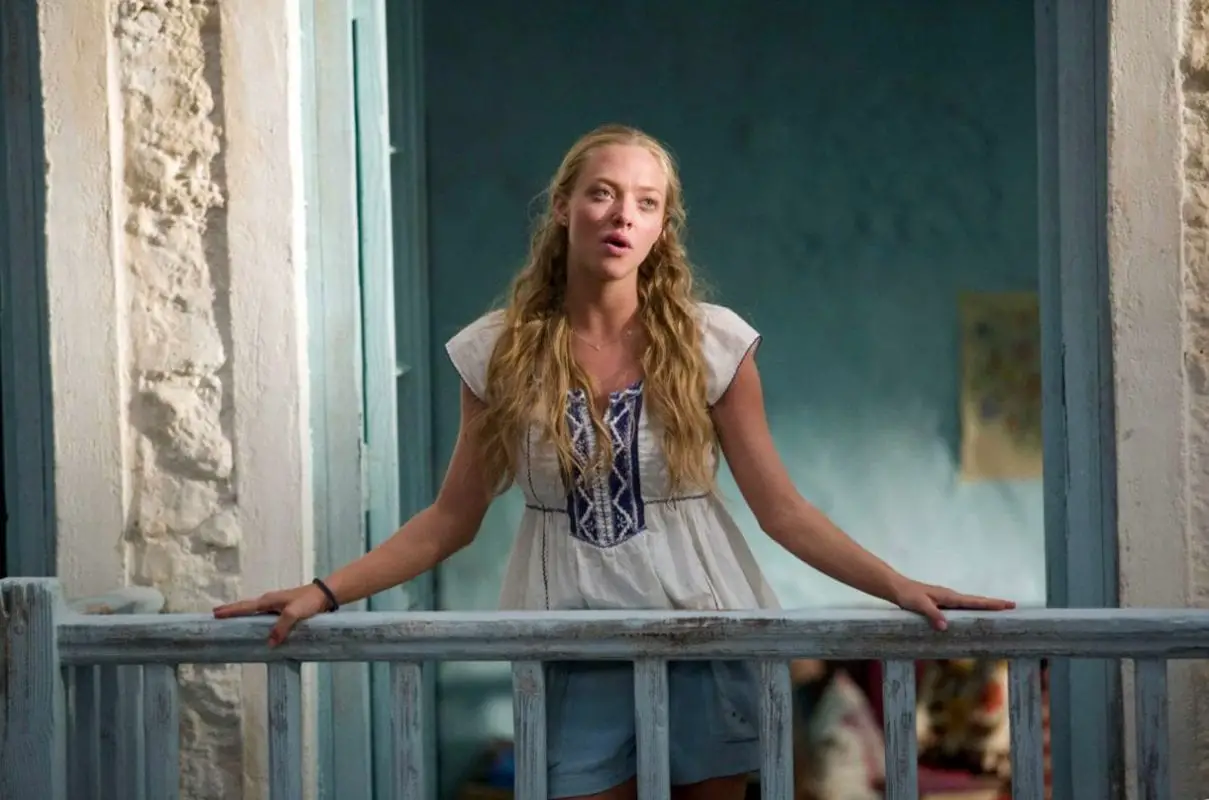
Donna, a product of both the post-World War II baby boom and the liberal sexual politics of the 1960s, has forgone the domesticated traditions of yore and spent her late adolescence attempting to find herself through gallivanting across Europe and indulging in casual sex. Her rebellion from the strict Catholic upbringing of her childhood manifests itself in the seduction and conquering of three men: one American (Sam), one Swedish (Bill), and one English (Harry). The trifurcated nationalities of these men represent the extent and spread of counterculturalism across Western society in the mid-to-late 1960s; the influence and after effects of such a rebellion against social norms provocatively envisioned by Lloyd, as catalysed by Donna’s travels circa. 1979. Her hedonism results in a degenerate good time all in the name of self-discovery and the exploration of the sexual self. Pregnant as a result of her dalliance, Donna gives birth to a daughter, Sophie, who she rears on the fictional—like Summerisle—Greek island of Kalokairi. 20 years on, Sophie is now a young woman to be wed to Sky. Donna, “an old hippie” as her vampiric best friend Tanya (Christine Baranski) classifies her, is living an unconformed life away from both society with her daughter and the phallic symbol. Her refusal to abide by the old Gods of tradition and their conservative values manifests itself in the fractured identity of Sophie; one generation’s liberation is the burden of the next, Lloyd seems to be suggesting.
So too, in fact, has Donna’s self-discovery been echoed through the lives of her two closest cohorts, Rosie (Julie Walters) and Tanya (Baranski); women representing the extent to which counterculturalism may warp the self and taint the mind. Their characterisations are constantly subverted throughout the film and are defined by an instability of identity—a direct result of their past actions. Rosie, a hermit and a lone wolf, is the author of a successful line of cookbooks in her late-to-middle-ages, whereas Tanya is a serial bride whose conquering and later dismissal of three previous men has left her a wizened scarecrow lost to time. The emphasis early in the film on her use of beauty products containing extracts of donkey testicles aligns her with the mythological figure of Dionysus, the Greek God of wine (Tanya declares her soulmate as wine within the sequel) frequently associated with donkeys. However, Tanya’s ways and actions align her more within Dionysus’ spiritual command of ritual madness, “Does Your Mother Know” ritually manic in Tanya’s eroticised attempt in the seduction of local bartender (and slave) Pepper (Philip Michael). In conjunction with this, both Rosie and Tanya represent a contemporary reimagining of the Ancient Greek mythological figures of the Harpies, the women equally fitting the description of “a rapacious monster…having a woman’s head and body and a bird’s wings and claws or…a bird of prey with a woman’s face.”
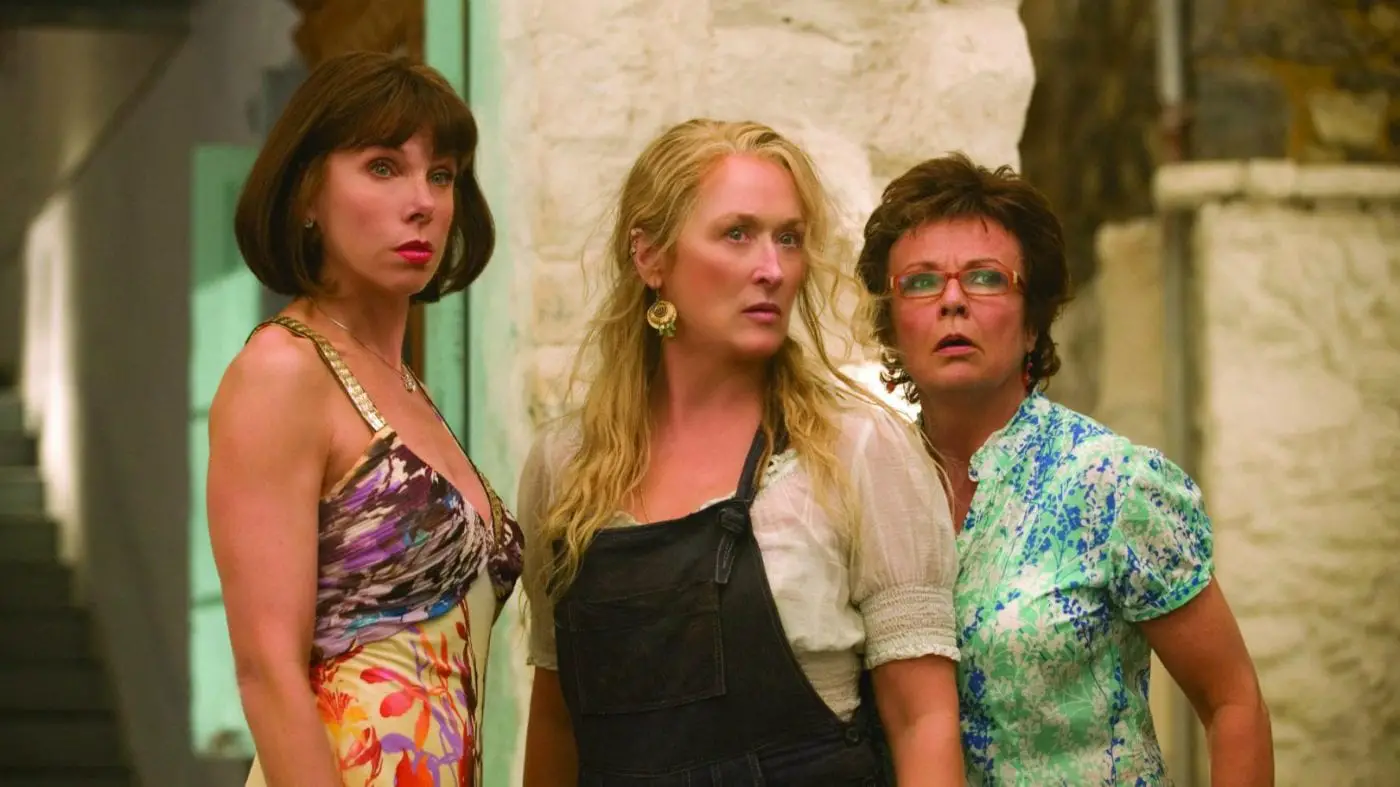
This same fate has not escaped the men within the narrative either, as Sam, Bill and Harry are collectively devoid of the happiness seemingly guaranteed to them 20 years prior during Donna’s European sexual odyssey. The joie de vivre so promised to Donna, Rosie, Tanya, Sam, Bill and Harry by their counterculturalism and liberal bonhomie has soured 20 years on from “our last summer”, and is now characterised by a yearning for tradition (marriage, family, all of which are present within the film). The assertion of said tradition Sophie believes will allow her to take possession of her father figure (whoever that may be) which will render “everything…to fall into place” with her identity cohered as a result. Within Mamma Mia! there is a direct relation between the sins of the past and the corruption of the later generations raised as a result of the egotism of the Baby Boomer generation; ego subsequently being passed down through time with the souring of idealism and the realisation of past degeneracy ushering in an era of malaise characterised by a yearning for the past and the loss of identity. There lies its key, fundamental connection to and expansion of The Wicker Man; where Hardy’s film was delivering a haunting forecast of the social malaise that would form through the shallow interpretation of countercultural ideologies, Mamma Mia! represents the existential angst stemming from “our last summer” with a clarity shocking and upsetting in order to represent the affectless postmodernism of the 2000s and the disillusionment of American society in the new millennium.
In terms of the idolatry present within Mamma Mia!, the pagan Gods of the Sun and the Sea worshipped in The Wicker Man are replaced by the Benny, Bjorn, Agnetha and Anni-Frid of Swedish supergroup ABBA. This manifests itself through Phyllida Lloyd’s engagement with postmodern theory that allows her to steep her social and cultural satire within an affectless gauze of irony and pastiche, in order to represent the idolatry of pop stars circa. 2008. Within the postmodern age, the Baudrillardian simulacra and simulation manifests itself within the absurd pastiche of popular culture; a melange of sounds, sights and images forming a hyperreality of flat affect to replace original thought and frame society within a confused blend of signs and signifiers. This simulacrum of society is present within Mamma Mia! through the elevation of ABBA from mainstream pop darlings to prophetic pop figures representing the joie de vivre so absent from the film’s array of sad-sack degenerates. As our cast croon, warble and (in Pierce Brosnan’s case) honk their way through the glorious ABBA songbook, they salute and pay homage to their Swedish pop idols. The songs—as they are in The Wicker Man—incantations in which to woo, serenade and enchant each other within a ditzy gauze of delusion and madness.
Exemplifying hysteria through their engagements within an island-wide rapture not unlike those seen in Ken Russell’s masterpiece The Devils, the numbers “Money, Money, Money”, “Dancing Queen”, “Gimme! Gimme! Gimme! (A Man After Midnight)”, “Voulez-Vous” and “Does Your Mother Know” represent the enchantment that results from the exposure to ABBA within the postmodern era; the songs sublime echoes of a joy long forgotten. The musical numbers represent the fever-pitch of emotion that resides within our manic cast of characters as a result of their starvation from tradition, their faux-joy a mask in which to hide their true feelings of longing and regret. Through adhering to the generic conventions of the jukebox musical—just as The Wicker Man so unforgettably did with the tropes of British folk-horror—Mamma Mia! is thus able to discuss its existentially fraught subject matter of post-60s disillusionment through the postmodern pastiche of irony, surface and the simulacra and simulation of society; generic conventions used stylistically in order to represent moral and social collapse and its hysterical effect on society at large.
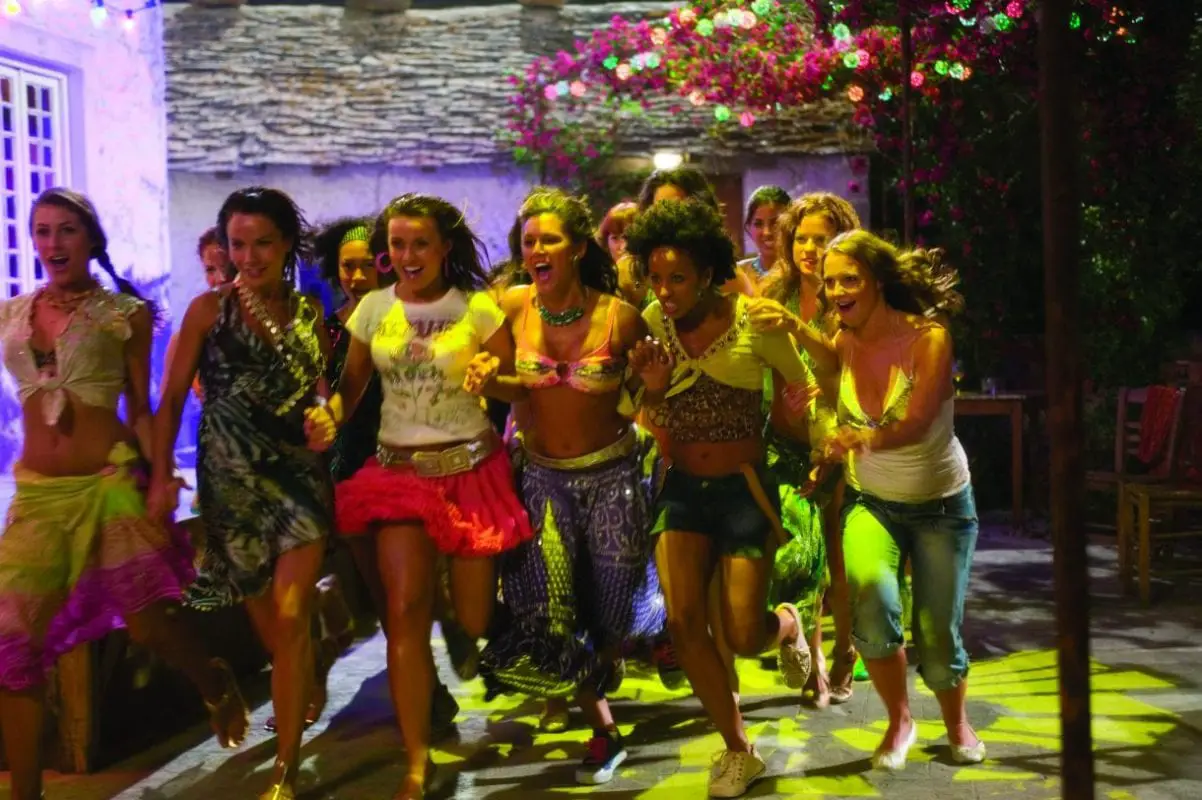
Similarly, it is through the ironic representation of the spiritual bond between mothers and daughters that both further aligns Mamma Mia! with The Wicker Man and steeps its social satire within a sharp, scabrous realm of unease. Donna and Sophie’s bond is one of deep, harmonious love and affection, as Donna is a matriarchal presence offering companionship and adoration whenever needed for the damaged Sophie. However, it is clear from Donna’s sly distaste of Sophie’s wedding (she replies “Of course not!” when asked if she really wants Sophie to wed early in the film) that she is fiercely dependent on her daughter to retain stability and order within her life. The manic, flailing insanity we see in Donna’s actions catalysed as a direct result of Sophie’s upcoming nuptials. She exerts a control (“but suddenly I lose control, there’s a fire within my soul” she blasts in the film’s title sequence) over her daughter not a world away from the authoritarian influence Lord Summerisle exerts over his followers in The Wicker Man.
This fierce determination to control and dominate has internally developed within Donna due to her lack of venerating the phallic symbol so central to the narrative and has catalysed an adoption of typically male characteristics. Through this, we can see Donna’s possession of Sophie as an attempt to fill the masculine role of the father to retain order within her daughter’s life through shrouding her within a veil of ignorance. The film’s opening number, “Honey, Honey”, depicts this very ignorance, replaced with gained knowledge on Sophie’s behalf through the reading of Donna’s diary, written during her European dalliance 20 years prior; the motif of ellipses within the prose a symbol of the Boomer mentality of leaving history to subjective interpretation by the younger generations, as Sophie’s discovery of her past triggers the pieces to fall into place within her innocent, yet existentially fraught existence.
Donna’s fierce dependence on her daughter is further revealed through the autocratic rule she holds on the island of Kalokairi and the capitalist grasp she has over its citizens. This grasp represents in macrocosm the control Donna exerts over Sophie and her need to dominate those around her. The vanity of titling her hotel the Villa Donna elucidates the tyrannical power she wields over her environment—the Villa Donna a stronghold to civilised society to which the Greek inhabitants are oppressively subjugated by their ruler. Their downtime is filled with the manic fits of musical hysteria we see throughout the film, as “Money, Money, Money” and “Dancing Queen” are both respectively deranged and near-demonic in their cheery goodwill and wish fulfilment fantasies of female empowerment within a lunatic society. Like Lord Summerisle, Donna’s followers—the little “super troupers” if you will—bend to her every will and need throughout; the uncomplaining silence and uniformity to which they carry out their strenuous labour a sign of their complete and utter devotion to their leader. Donna complains of her lack of financial resources within the “Money, Money, Money” sequence early in the film. Her workforce of supposedly hundreds more than overpowering Donna’s ability to pay each worker fairly and equally within her self-imposed capitalist-leaning economic society. How does she pay these people?
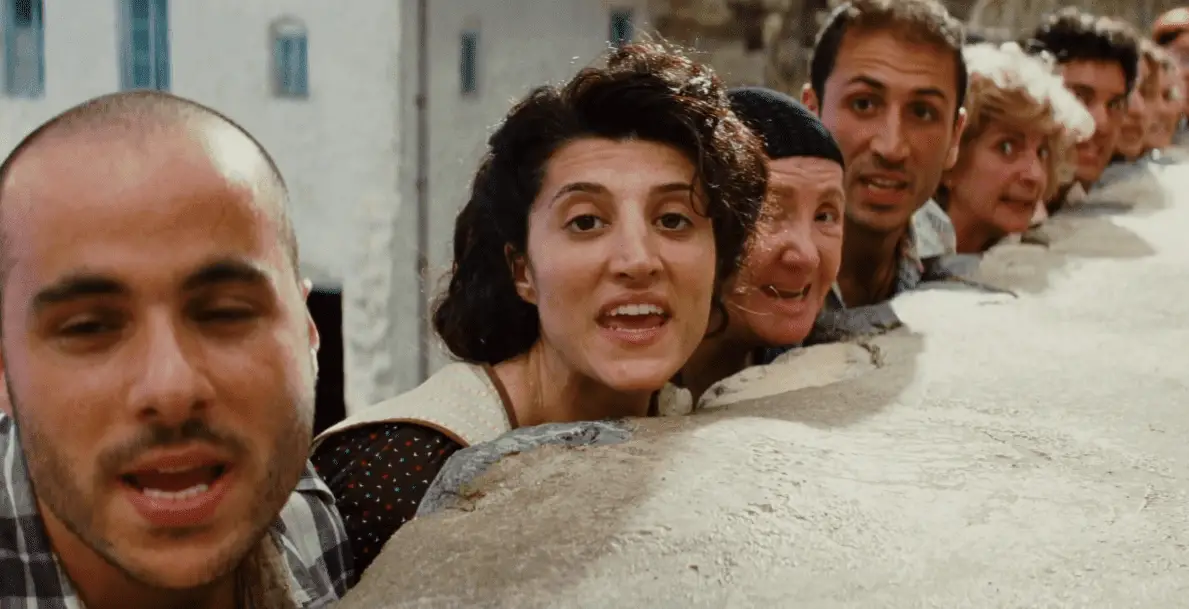
Simply, she doesn’t; her followers blithely carrying out their work free of charge. Their days spent under their capitalist tyrant devoid of monetary gain despite such back-breaking labour, and strenuous singing and dancing filling their time. The iron grip she holds over her island is a product of her own hubris and is maintained equally by her dependence on Sophie and longing for the phallic symbol. In fact, our “Dancing Queen”, the dastardly Donna Sheridan, admits to this tyranny within her (suitably ridiculous) power ballad “The Winner Takes It All”; her hubris evident in her identification with the winner of the song’s title; the victory alluded to in the number’s opening moments cleverly epitomised through the figure of Sam symbolising her past. Sam is an awkward presence in an already awkward sequence, and Donna enchants him with the near-Brechtian, unironic self-seriousness evident in the fierce determination exuded through her performance. Phyllida Lloyd is allowing her protagonist to confess to her sins, and declare herself victorious over time itself. Donna is, therefore, the winner in her self-determined life of excess and non-conformity. Her delusion therefore evident.

In relation to this, however, it is clear that Donna’s days are numbered. The absurd fits of laughter and judgement shared by the island’s little super troupers are an eerie symbol of incoming revolt. As Howie claims in The Wicker Man: “next year, no one less than the king of Summerisle himself will do” as the role of the sacrificial figure should his own death fail to bring life to the impossible agriculture of Summerisle, the audience left to ponder whether a revolt against the autocracy of the island will occur the year after the events of the film. We may never know whether the crops of Summerisle flourished or failed, but, in the case of Mamma Mia!, we were granted a vision of the future of autocratic rule within countercultural societies 10 years after the release of Lloyd’s film; Ol Parker’s Mamma Mia! Here We Go Again is a majestic, melancholy sequel that revels in a post-ironic sincerity rife for political analysis and scrutiny.
Mamma Mia! Here We Go Again or: “Why Did It Have To Be Me?”
(Note: this chapter is brief due to my previous discussion of Donna’s past being consummate prior in the study; this film represents that past in glorious detail, yet does not add to or expand upon details present within the first entry into the series)
Why did it have to be me indeed! Like Twin Peaks’ Freddie Sykes, I asked myself “Why me?” upon embarking on this analysis. The question of whether or not I was up to studying such an elaborate cinematic conspiracy gnawing at my psyche, as the double features of both The Wicker Man and Mamma Mia! began warping my mind in a theological hurricane of sacrifice, show tunes and the honking of one Pierce Brosnan. Why was I chosen to unravel the devilish delights of these films and their interconnections across time, and would I be able to wrap my brain around the insanity of a Mamma Mia! sequel without the abyss inevitably inverting its gaze and looking upon myself? Soon, upon seeing the orgiastic absurdity of Mamma Mia! Here We Go Again and reliving the electric energy that comes with the first viewing of a Mamma Mia! film, the tidal wave of saccharine bonhomie present within the film carried me on a blissfully transcendent ABBA odyssey and affirmed my extensive conspiratorial theorising on the elusive Mamma Mia! and its bottomless pit of mystery. To put it bluntly, my experiences with Here We Go Again have been as fulfilling as my previous deep dives within the black hole that constituted the previous film. The fresh and the familiar are fused within the sequel to form an incandescent emotional phantasmagoria in which the hazy mythology of the first film is represented in staggering detail as the viewer crisscrosses through time from the past to the present and from the land of the living to the land of the dead subtly, yet effectively.
From the opening moments of the film, the audience is immediately cued into the fate of our degenerate tyrant, Donna Sheridan, in the years following the events of the portal-into-hell original. Simply, in the intervening years, Donna has fallen victim to the deranged whims of her followers and has been sacrificed to the Swedish Gods of pop in the name of excess and greed. Donna was a figure of the past, Kalokairi’s future embodied in the now 30-year-old Sophie Sheridan, a victor in her own narrative due to the capturing and possession (remember the Electra Complex?) of her father Sam; the reconciling of her identity in the events proceeding this sequel rendering her a woman whole and worthy of the “Dancing Queen” title previously held by her mother. Before it was the Devilish Donna who ruled the roost; now it is her daughter, the sacrilegious Sophie who calls the proverbial shots on the Kalokairi of 2009 AD (the year the film is set). The slaves have revolted, their uprisal rooted in the scheming of Sophie and Sky seen in the previous film. The emphasis on and excitement surrounding the publicity of the Villa Donna in Mamma Mia! on behalf of Sophie and Sky was curiously forgotten after its introduction early in the first film. The advertising of the island “on-the-line” a ploy in which to fool the adherents to the cult of Sheridan into turning on their ruler, and ultimately allow the twinkly-eyed Sophie, Donna’s next-of-kin, to assert herself as the degenerate tyrant to rule them all.
Donna has fallen victim not only to her followers but also to her own daughter Sophie “slipping through (her) fingers” further than she had anticipated. Clearly, Sophie and Sky’s ploy has been ingeniously designed to fail and flounder in an effort to degrade the island’s citizens further through taunting them with imagined riches (profits from tourism generated through successful online marketing) and crushing their spirits in the process. The subjugation of the workers under Donna’s rule broken from the inside through ritual sacrifice in hopes of appeasing the Swedish pop Gods of Benny, Bjorn, Agnetha and Anni-Frid, and delivering them the wages owed to them during their subservience to their leader. This information may be gleaned through an intense study of the first film and the careful observation of the opening moments of the sequel and begs the question: can the effects of counterculturalism ever truly pass or are they to lay dormant, ideologically present yet physically absent, within the postmodernity of contemporary western society?
The wall-long murals commemorating their past leader is an instant signal of the continued presence of Donna within the film despite her death. The mournful despair within Sophie’s lilting “Thank You for the Music”, director Ol Parker’s knowing reveal of Donna’s death and subliminal referencing of the transference of egotism that will make itself apparent late in the film. The “Google-Image-Search-Copy-And-Paste“ photograph of the devilish “Dancing Queen” of yore forms the centrepiece of Sophie’s luxurious abode in the newly refurbished hotel; the mural regal, reverent. The absence of context surrounding her death here suggests a bond of silence entered into by Sophie and her adherents: no-one will know the depths of degeneracy reached on Kalokairi. But we know, we know…an explanation of her death is seemingly absent for a casual audience; the informed viewer understanding the fate of the degenerate Donna immediately from this opening.
Despite her death, Donna haunts the proceedings nonetheless. The film explicitly detailing her wooing of Sam, Bill and Harry in 1979 AD. whilst simultaneously representing her legacy of the Villa Donna, seemingly a ‘Wonder of the World’ currently ruled by Sophie. Donna has been sacrificed in the name of greed, status and the “money, money, money” she so desperately pined for within the final stages of her depraved existence. However, the viewer is left in suspense as to whether the sacrifice worked or not. The acceptance of Donna by the ABBA Gods unrevealed until the manic, hallucinatory conclusion of the film.
The stage is set, a party has been planned. One year to the day (presumably) after Donna’s ritual sacrifice, Sophie organises an absurd celebration to commemorate her recently deceased mother by providing the Villa Donna with a grand reopening—a thunderstorm of hilarious inconsequence rocking the island early in the film as a warning to beware from the Gods of goodwill and tradition. But alas, even in death, Donna is able to work her charms. The sacrifice is a success and the party is a debauched nightmare of Bacchanalian excess. The imagined “boatloads” of tourists dreamt of in the previous film materialising by way of a glorious musical salute to the Devilish Donna by way of restaging the iconic “Dancing Queen” number of Mamma Mia!. Through this sequence, friends and family are reunited with joyous aplomb; Rosie, Tanya, Bill and Harry making their way to the fiesta to indulge their senses within a Greek-accented celebration of hedonism seemingly organised by the mythological figure of Comus, the Greek God of festivity and nighttime dalliance, himself.
This is haunting and most disturbing: meaning has been lost and replaced with a social and cultural incoherence etched in wine, semen and fireworks; immorality an accepted and celebrated facet of society within the post-60s, postmodern hellscape of broken dreams and tainted love represented in the film. Donna was, after all, as Lord Summerisle proclaimed, “the right kind of adult.” Indeed, her degeneracy saluted as the wine flows on the magical isle of Kalokairi. A moment of remembrance and commemoration, Sophie’s heartfelt “I’ve Been Waiting for You” at the celebration’s conclusion is a melancholy ode to Donna by way of Rosie and Tanya as her now assumed, collective maternal figure. She salutes her now inherited legacy of leadership and the responsibilities that come with tyrannical rule and welcomes the world with open arms—her identity cohered and the phallic symbol venerated wholly.
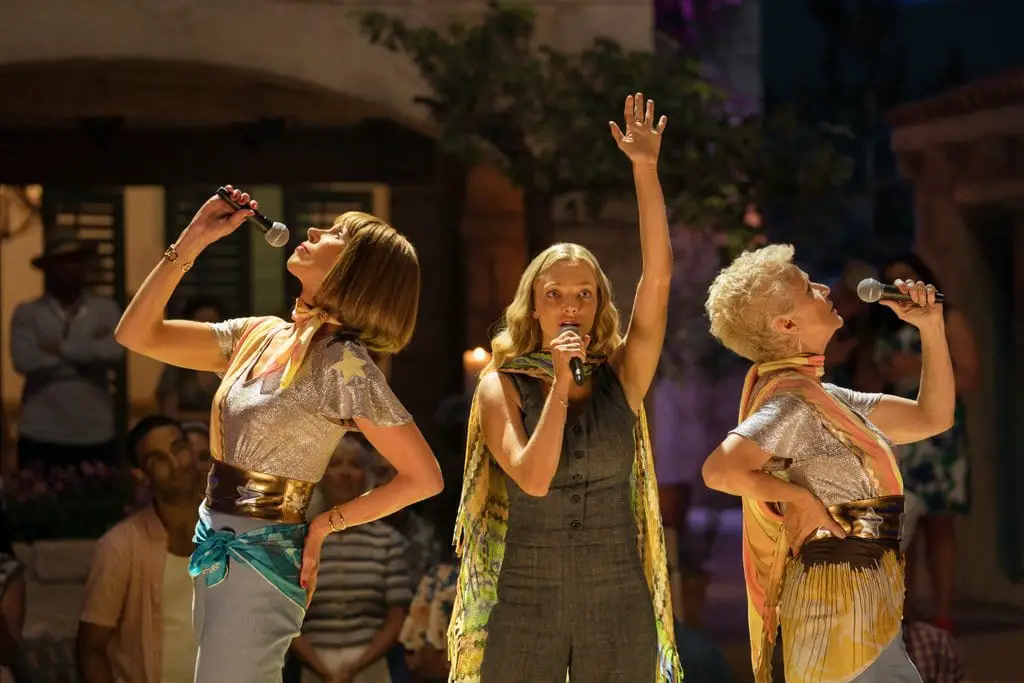
But finally, of course, we cannot depart from the depths of Mamma Mia! Here We Go Again before one last glimpse of Donna in the flesh; the christening (!) of Sophie’s newborn child, represented by Parker as a sequence of ghostly, spiritual transference and communication. The two women (one a symbol of countercultural depravity, the other a physical manifestation of the trauma catalysed by the assimilation of countercultural ideologies within society at large) perform a loving duet proclaiming their love and affection for one another, nine months after the reopening of the hotel through the number “My Love, My Life”. Sophie, a new mother of a daughter, expresses her adoration for her mother throughout the sequence. Donna, a degenerate spirit haunting the land of the living in her postmortem limbo, replying with a lilting response across the very fabric of our reality itself. Ol Parker truly has left the best for last, “My Love, My Life” ABBA’s greatest, most moving entry into the pop canon. References to hubris, predestination, ownership and reflection pepper the number and are used in order to represent the final transference of power that will allow the coronation of Sophie, our new “Dancing Queen”, to be etched in stone and take her place as both the rightful heir of Summerisle (no, Kalokairi) and a tyrant for decades to come.
As the viewer is overcome with titanic waves of tears and emotion (no, just me?), Donna (her younger Lily James incarnation) croons such lyrics as “I’ve never felt so strong, I’m invincible, how could this go wrong?” with a lilting determination signifying her hubris, her power and strength in maintaining such inhumanity both in her younger and older years a key factor in the development of the Villa Donna and the socialisation of Sophie. The lines “No here, here’s where we belong…I see a road ahead, I never thought I would tread” become a representation of the hesitation and doubt the young Donna would have felt upon embarking on the tyrannical “road” that would so define her identity as Kalokairi’s Queen of the Bay, one of Summerisle’s most venerated Goddesses. A call and response from the past to the present, Lily James becomes Meryl Streep to stunning effect within this sequence; the rim of the christening vessel forming a vignetted frame unto which Streep appears; her materialisation from a ghostly “other” to flesh and blood crone soon after revealing her continued influence on the earthly plane and persistence of domination over the island of Kalokairi.
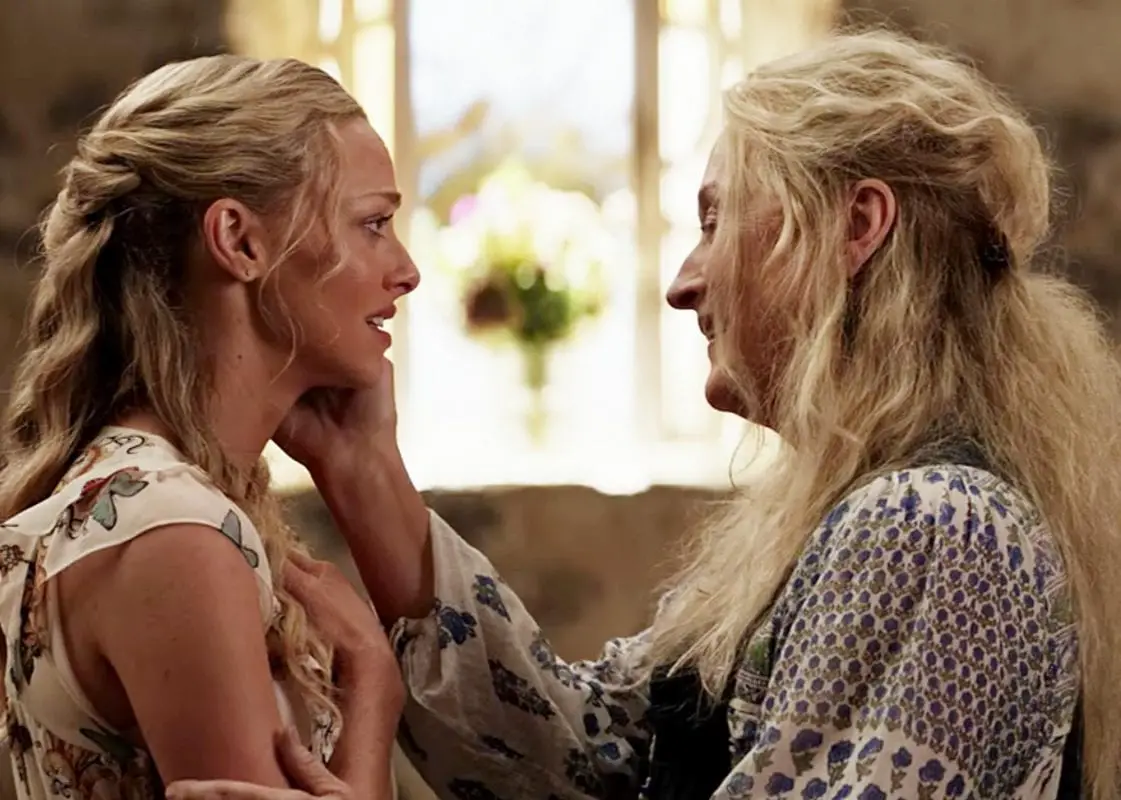
A motif of reflection is similarly established through the lyrics “In the mirror of your eyes” and “like reflections of your mind”. Sophie’s growth into the island’s next suitable leader is thereby acknowledged by the devilish degenerate Donna, as mother and daughter become a mirror of one another, and both women become reflected wholly in each other’s eyes and minds. The reference to ownership comes in the form of “But I know I don’t possess you, with all my heart God bless you”, Donna’s realisation that she can no longer possess and take dominant control of Sophie signified and revealed. She understands that she must depart this earthly realm and leave her daughter to her own devilish devices as she embarks on her own term of leadership, “with all my heart, God bless you” further revealing the hubris and egotism embodied by Donna in her use of the label God, with reference to herself. This egotism is passed onto Sophie through osmosis; the passage of degenerate ego from parents to children pointedly satirised and detailed here.
Through this, the transference of legacy between mother and daughter is complete and a new path is formed. The use of Christian iconography through the church/christening setting steeping the scene within the realm of warped theology, and suggesting that Sophie’s young daughter—an unnamed figure, curiously—is the next in line for leadership, the indoctrination of the young laid bare by the subversive Ol Parker. This cycle will continue and it is only a matter of time; “here we go again” indeed. As Donna exits the church, her haunting visage is framed centrally and with salience, her smile a skin-crawling reminder of the extent to which counterculturalism has subverted dominant ideologies and paved the way for the gradual destruction of tradition and the degradation of the self. The Sheridan’s have triumphed; all hail ABBA!
Odysseys revealing the deepest, darkest depths of inhumanity, The Wicker Man, Mamma Mia! and Mamma Mia! Here We Go Again represent an extraordinary transference of theme and concern to which the pained warning of Robin Hardy is fully embraced and answered by modern maestros Phyllida Lloyd and Ol Parker. Their striking similarities reveal a thematic continuity through time to which a cinematic call and response is therefore established; each film is rich, subversive, and deeply unsettling.

Together, all three films passionately warn against countercultural liberalism and satirise its tyrannical political extremes that stem from the dismissal of dominant, conservative understandings of morality and tradition. They expose the devastating effects of such counterculturalism on children and mourn the generations lost to degeneracy and social immorality. The depths of idolatry are similarly detailed with nightmarish aplomb through the films, with Hardy, Lloyd and Parker playfully commenting upon generic conventions and their stylistic use for reasons pertaining to political satire and commentary. The Wicker Man, Mamma Mia! and its sequel are bawdy, blasphemous and brilliant; genius, fiery works of political satire that when viewed cyclically—with one film leading into the other—becomes a hellish document of social collapse catalysed by the breaking away from tradition and onset of countercultural ideologies seeping into the homes, schools and societies of the West. “The Name of the Game”, in this case, is the expansion of social and cultural malaise by way of the transference of egotism through the generations as a result of the soiled dream of the ’60s. Lord Summerisle, Donna Sheridan and Sophie Sheridan triumph over the will of the world and are symbolic of the capitalisation of counterculturalism by tyrants the world over for authoritarian, autocratic gain. They are our “Dancing Queens” and we are their “Super Troupers”. God save us.


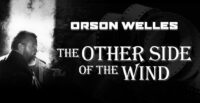

Excellent work And well written Joel